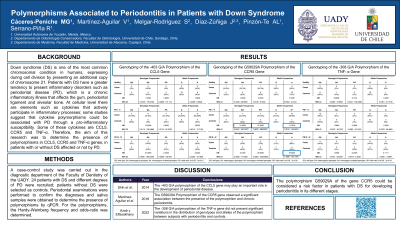Other
140 - Polymorphisms Associated to Periodontitis in Patients with Down Syndrome


Maria Georgina G. Caceres Peniche, DDS (she/her/hers)
Student
Universidad Autonoma de Yucatan
Merida, Yucatan, Mexico- VM
Victor Manuel Martinez-Aguilar, Doctor
Universidad Autonoma de Yucatan
- SM
Samanta Melgar-Rodriguez, Doctor
Universidad de Chile
- JD
Jaime Andres Diaz-Zuñiga, Doctor
Universidad de Chile
- AP
Alicia Leonor Pinzon-Te, Master
Universidad Autonoma de Yucatan
- RS
Rodrigo Serrano-Piña, Doctor
Universidad Autonoma de Yucatan
- AP
Alicia Leonor Pinzon Te, n/a
Professor
Universidad Autonoma de Yucatan
merida, Yucatan, Mexico - MC
Martha G. Chuc Gamboa, N/A, n/a
Professor
Universidad Autonoma de Yucatan
Merida, Yucatan, Mexico
Presenting Author(s)
Co-Author(s)
Research Mentor(s)
Program Director(s)
Purpose: Determine the presence of polymorphisms CCL5, CCR5 and TNF-a genes, in patients with or without Down Syndrome (DS) affected or not by periodontal disease (PD).
Methods: A case-control investigation was conducted at the Diagnostic Department of the Faculty of Dentistry at the Autonomous University of Yucatan, approved ethically under the reference FODO-2019-0001. The study involved the recruitment of 25 patients with DS exhibiting various stages of PD, while 7 individuals without DS were chosen as controls. Each participant underwent a thorough periodontal examination to confirm the diagnosis. Saliva samples were collected for qPCR analysis to identify the presence of specific polymorphisms. For the polymorphisms, the Hardy-Weinberg frequency and odds-ratio was determined.
Results: The presence of the GA and AA genotypes in the CCR5 G59029A polymorphism, along with the existence of the A allele, it’s a risk for developing PD.
Conclusion: The polymorphism of the CCR5 receptor G59029A might be considered as a contributing factor in patients with Down Syndrome, into increasing the risk of developing periodontitis stage III-IV.
Identify Supporting Agency and Grant Number:

.jpg)